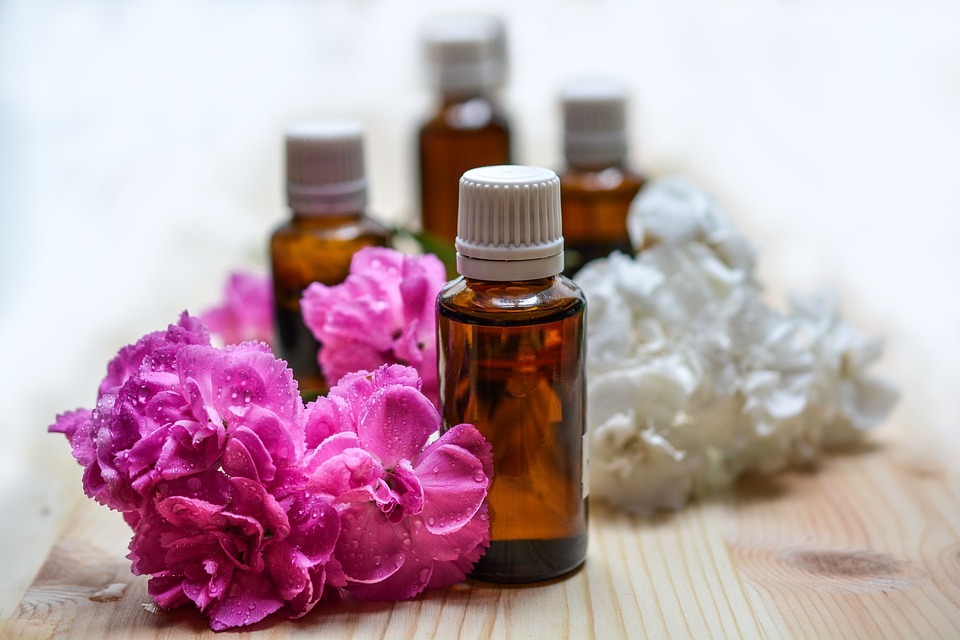Many people are suffering from acne-prone skin, and acne can affect everyone, no matter their age. Some of the obvious symptoms of acne are zits, bumps, and pimples on the face, neck, back, and chest. This occurs when bacteria, sebum or skin oil, and dead skin cells block the pores on your skin, making them inflamed, swollen, and filled with pus. When this happens, it’s a bit challenging to get rid of the spots and pimples, especially if the acne is severe.
Today, many products are being introduced, which are claiming to be effective when it comes to fighting acne. But if you are not into using chemicals on your skin, one of the best ways to make an acne-prone skin clear is by using essential oils. There are lots of essential oils that contain antibacterial and anti-inflammatory properties, making them great for treating acne. Aside from that, essential oils can also help relieve stress, which is sometimes the reason why the skin becomes prone to acne.
If you are looking for the best essential oils to use for your acne-prone skin, you’re in the right place. Today, we are giving you a list of the essential oils for people with acne-prone skin, and how they are best used to make your skin clear and blemish-free.
Clary Sage Oil
Clary sage is related to the common garden herb sage, and it is useful in fighting acne. According to a study, clary sage is highly effective against bacteria that cause acne breakouts. This is because clary sage oil has excellent anti-inflammatory properties, and it can also help in preventing scars, marks, and blemishes from acne.
When using clary sage oil for acne, add a few drops of it to a carrier oil of your choice and mix them well. You also have the option to add a drop or two of the essential oil to your face mask or face cream. Massage the mixture of oils onto the affected area. You can do this twice up to thrice a day, depending on how severe your acne is. Never use this oil undiluted, and never put more than 2% of it on your skin.
Bergamot Oil
Bergamot is a citrus-based essential oil that has antibacterial properties. It is popularly known for fighting skin inflammation. Based on several studies, this essential oil has antimicrobial and antibacterial properties that help prevent acne. It can also help in removing impurities, excess oil, and can also open clogged pores and disinfect the skin.
To use bergamot oil on acne-prone skin, pour some liquid castile soap in a bowl, then add some distilled water, 5 drops of bergamot oil, and 7 drops of tea tree oil to it. Mix them well and put the mixture in a bottle. After making the mixture, take a small amount of it in your palm and wash your face with it. You can wash your face using this bergamot oil mixture, not more than twice a day. Remember to not go out in the sun immediately after using the facial wash because bergamot oil is phototoxic.
Tea Tree Oil
Tea tree oil is one of the best essential oils you can use for acne treatment. Based on a study, tea tree oil was highly effective in treating acne vulgaris. It’s because it has antimicrobial and anti-inflammatory properties that can kill acne-causing bacteria and reduce inflammation, as well. This oil can penetrate your skin and unblock the sebaceous glands on your face. Meaning, it can unclog the pores and reduce acne.
To use tea tree oil, pour two to three drops of it on a Q-tip or cotton pad. Then, dap it on the affected area and leave the oil on for a few hours before washing it off with water. You can do this regularly before sleeping, but do not do it more than twice a day because it can make your skin dry.
Chamomile Oil
Chamomile essential oil is popular for its calming properties. But it is also very useful when it comes to controlling skin inflammation. It’s because this essential oil has antibacterial properties that help reduce acne, zits, and small bumps. It soothes the inflammation around the acne.
To use it for acne, you can mix 2 drops of it to 30 mL of jojoba oil. After mixing, take a pea-sized amount of the mixture in your hand and mix it with some aloe vera gel, then apply it to your face. Aloe vera can help in hydrating and moisturizing your skin.
Chamomile is a safe essential oil to use. However, if you are pregnant or a nursing mother, it’s better to consult with a healthcare professional first before using it.
Lavender Essential Oil
Lavender is one of the most popular and commonly used essential oils. Based on a study, inhaling it has a calming effect. Since stress often results in acne, inducing calm can surely help in controlling the breakouts, as well. Aside from that, lavender also has antibacterial properties and can help in killing the bacteria that cause acne.
To use lavender essential oil, boil a bowl of water then add 10 to 12 drops of lavender oil to it. Then, bend over the bowl, cover your head and the container using a towel and inhale the steam. After inhaling some lavender steam, do not wipe your face and let it dry naturally. Then, wrap an ice cube in a cloth and rub it all over your face. You can repeat this daily for the best results.
Sandalwood Oil
Sandalwood essential oil is also extremely beneficial when it comes to controlling acne and breakouts. It’s because this essential oil is astringent and antiseptic, which helps in locking in moisture. One of the most beneficial in treating acne is Indian sandalwood. It was found to decrease the severity of acne. Aside from that, it can also treat other skin conditions, including psoriasis.
When using sandalwood to fight acne, you need to add 2 to 3 drops of sandalwood oil to a carrier oil, either coconut, jojoba, or argan oil. Mix them together and store them in a separate bottle. After making the mixture, massage some of it on your face or the affected area and spread it evenly. You can repeat this routine twice daily. Just make sure that it does not get into your eyes. You also shouldn’t use this oil if you’re pregnant or nursing.
Juniper Berry Essential Oil
Juniper berry essential oil has antiseptic, detoxifying, and circulation improving properties. According to a study, this essential oil was a potent solution for acne when applied topically. Its antibacterial and detoxifying properties can eliminate the bacteria and toxins from your body, which can help you in achieving clear skin.
To use it on acne-prone skin, extract some aloe vera gel from the plant, then add 2 to 3 drops of juniper berry essential oil to it and mix them well. After that, apply the mixture on your face and leave it overnight. You can do this once or twice a day, but not more than that. Also, never use pure juniper berry oil on your skin because it can cause irritation. Before applying to your face, do a patch test first, and if you experience irritation, wash it off of your skin immediately.
Basil Essential Oil
Basil has antimicrobial properties, making it highly effective in controlling acne. It can deeply nourish the skin and reduce the activities of microbes and germs, which cause inflammation and as well as skin infections. Basil also has linoleic acid, which has anti-inflammatory properties that can help in soothing the swelling of acne.
To use basil essential oil on acne-prone skin, mix 2 drops of it with 2 teaspoons of aloe vera gel. Then use your fingers to spread the paste on your face or on the affected area. You can do this twice every day for the best results.
Rosemary Essential Oil
Rosemary essential oil contains compounds that can help eliminate excess oil from the skin. It also kills bacteria and helps reduce swelling that is present when the pores are clogged. To use this oil on acne-prone skin, mix 6 drops of it with ¾ cup of oatmeal, ½ cup of green tea, and ½ cup of rosewater. Then, apply the paste to your face or to the affected area. Let the paste dry on your face then wash it off.
This is effective because oatmeal can scrub the skin gently while rosemary oil and green tea provide the antibacterial properties to kill the germs and bacteria on the skin. Rosewater, on the other hand, can help in soothing the skin. However, if you are pregnant or suffering from epilepsy, avoid using rosemary. Also, do not use this excessively as it may lead to skin sensitization. You can apply once daily before taking a bath.
Eucalyptus Essential Oil
Eucalyptus can help in reducing sebum on your skin, meaning it is also useful in managing an acne-prone skin. It contains antibacterial properties that aid in reducing the levels of oil made by your sebaceous glands. Aside from that, eucalyptus oil also has medicinal properties that can also treat acne, boils, and cysts, more than killing bacteria.
If you want to use it on acne-prone skin, add 2 to 3 drops of it to your moisturizer and mix them well. Apply the mixture to your entire face or on the affected area only. You can do this every night before sleeping. However, if you have asthma, this can be irritating to your respiratory system. Therefore, use this essential oil cautiously.
These are the best essential oils that can be used by people with acne-prone skin. There are still lots of other essential oil recipes out there for acne and acne-prone and oily skin. But we hope that the information we shared will help you achieve clear and healthy skin.

